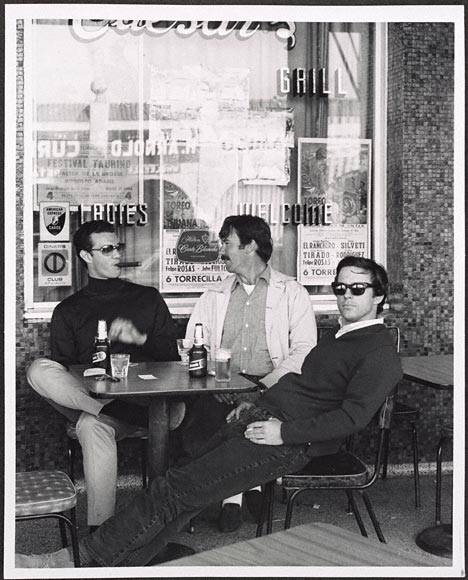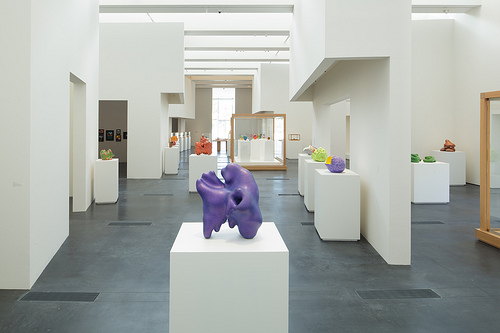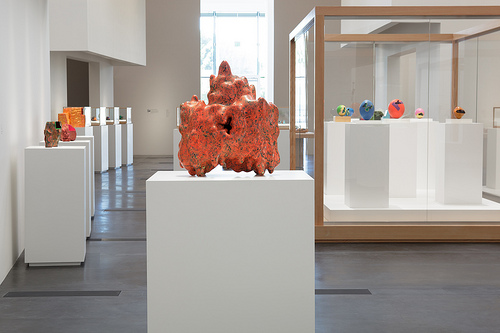
Larry Bell, Billy Al Bengston, and Ken Price outside Hotel Caesars in Tijuana, Mexico, 1968. Image courtesy of Larry Bell.
The Ken Price retrospective opened last night at the Los Angeles County Museum of Art. Before I left for the reception, I read Christopher Knight of the LA Times say that it was “exquisite,” in a review he must have written in a mad rush of excitement just after previewing the show. The first two paragraphs include the words “brilliantly nuanced,” “voluptuous,” “iridescent” and “richly patterned as a Persian rug.” I suspected some hyperbole, but felt a bit bubbly too when I saw for myself. Really, the retrospective is good in a guttural way. The organic and paradoxically precise sculptures, sometimes with finger- or turd-like things oozing out of orifices, aren’t quite seductive. They’re something else — “otherworldly,” a friend of mine said, like aliens that are adorably wonky but also unfathomable in their perfection.

Installation view, "Ken Price Sculpture: A Retrospective," 2012, Los Angeles County Museum of Art. © Fredrik Nilsen.
The Ken Price show has been on the calendar for a few years, which means the irreverent ceramics artist contributed to its planning, before his death from cancer in February of this year, at age 77. Photographs in the catalog show aggressively colored, globular works Price made for the show in progress in his Taos, New Mexico, studio. So for curators and friends — including architect Frank Gehry, who knew Price for decades, and is responsible for the weirdly tiered ceilings and windowed partitions built up above and around Price’s work — it’s got to be strange to have the show open and not have Price here. A “celebration of a life” preceded the LACMA opening. People close to Price spoke, like at a memorial service. Sculptor Ron Nagle said he felt like he was in church when he walked up to the podium to talk about the night he and his wife stayed up all night with Price and other friends and how that night he felt as close to Nirvana as he’d ever felt (in the morning, he was sure his wife must have fallen in love with Price). Vija Celmins (Season 2 of Art in the Twenty-First Century) talked about first meeting Price and his wife, Happy, at Riko Mizuno’s gallery in L.A., and how, later, they’d critique the sunsets together.

Installation view, "Ken Price Sculpture: A Retrospective," 2012, Los Angeles County Museum of Art. © Fredrik Nilsen.
The Bing auditorium at LACMA was full, but these speakers really were addressing a small crowd, the crowd of people like themselves, who had known Price through the early, middle and late years, who’d had dinner at his house. Artist Ed Ruscha was the only one that seemed to have known or cared that he’d be addressing a pretty big audience –he read headlines from Price reviews, and made jokes about them (“The Price is Right,” read one headline, and Ruscha said he didn’t think Kenny had ever been on that show, but probably someone had put a Ken Price piece on top of a TV. Price probably could’ve said “he’d been on TV,” and been perfectly honest).
Jackson Price, Price’s son and long time studio assistant, pointed out that this last year has been hard, since his family had lived such a charmed life and Price’s death meant, for the first time, they were all feeling real pain.
What made being there at that memorial sort of strange is that, when you walk through the exhibition itself, it doesn’t matter that much that Price’s friends love him or that he had a happy family (maybe it helps a bit to know he had a wife named Happy, since certain titles reference her). Last night, Ron Nagle remembered that Price used to say he wanted to be recognized but not approached.
It reminded me of something singer Josh Ritter said in a 2007 NPR interview. He was talking about Bob Dylan and Springsteen and Tom Waits — musicians he really admired. “But mostly, those guys, I don’t feel like I need to meet them or anything like that,” he said. “I feel like the best thing for them is to be left alone to do what they do. . . You know when a baby smiles at you, it’s proof that you exist. You get that great feeling. I think sometimes you just want to know that you exist. But that’s something I already know.” Ritter said he’d rather just leave those guys alone to do their thing. I’m glad most people there in that audience last night didn’t have stories about sunset critiquing or night of near Nirvana, because it means most of us left Price alone to do his thing.



